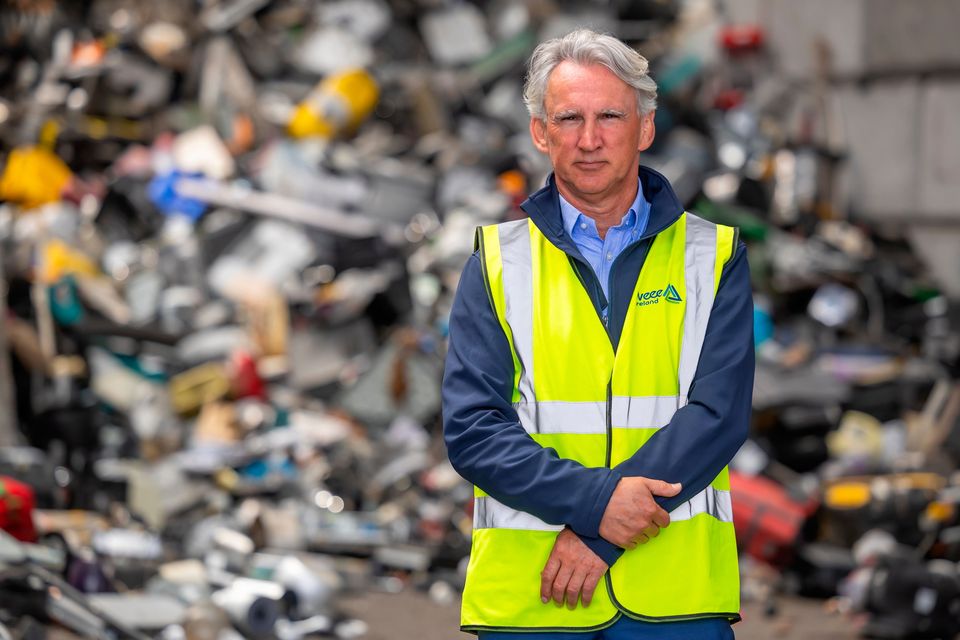Concern raised over unsafe dumping of electrical items
Research found one in eight people is putting unwanted items like earbuds and smart watches in household bins
Leo Donovan, CEO of Empathy Research data for Waste Electrical and Electronic Equipment (WEEE) Ireland, which conducted research showing that one in eight people in Ireland continues to dump small electrical items in household bins. Paul Moore /PA Wire
One in eight people in Ireland continues to dump small electrical items in household bins, research shows.
The rate for the improper disposal of the products, which has serious environmental and public health risks, almost doubles among younger age groups.
One in four 18 to 24-year-olds and one in five aged 35-44 get rid of common household electrical items such as smart watches, earbuds and bluetooth speakers in general waste bins.
Laptops, mobile phones, gaming devices, power tools and e-cigarettes are also being tossed in alongside other waste, meaning they can never be re-used or recycled, the Empathy Research data for Waste Electrical and Electronic Equipment (WEEE) Ireland reveals.
The proliferation of products powered by lithium batteries heightens these dangers, increasing fire safety risks for household waste collection firms.
In the past five years, WEEE Ireland reported a 100pc increase in lithium battery-powered small electricals coming back for recycling.
Today's News in 90 Seconds - April 28th
WEEE Ireland chief executive Leo Donovan said: “For those that recycle their e-waste, our survey shows 75pc do so due to its positive impact on the environment, with over 50pc citing concerns over the hazardous components present in some of these devices.
“Despite this awareness, a significant number still opt to dispose of their waste electricals improperly, particularly when it involves smaller devices.
“Ireland’s impressive record for recycling larger household electrics needs to be matched when it comes to small electricals to ensure the safe and efficient recovery and reuse of materials they contain.
“Recycling these items is both free and straightforward as they can be dropped off at numerous, authorised recycling centres and public collection days across Ireland.”
The low recycling rates for small electrics are echoed in global statistics, with the recent Global E-Waste Monitor revealing less than one quarter (22.3pc) of e-waste was properly recycled in 2022, falling sharply to 12pc for small devices.
In addition, a recent Environmental Protection Agency study in Ireland revealed more than two-thirds of recyclable waste, including valuable electronic components, are wrongly discarded in general household and commercial bins.
Mr Donovan said there is an urgent need to meet forthcoming EU targets and secure sustainable sources of raw materials.
“The demand for critical raw materials contained in electrical devices is expected to skyrocket,” he said.
“The EU’s aim to ensure that by 2030, at least 30pc of critical raw materials consumed annually originate from European recycled sources underscores the imperative for swift and decisive action.
“Failure to address these pressing challenges not only risks our environmental and public health but also undermines our collective aspirations for a greener, more sustainable future.”
The Irish Waste Management Association (IWMA), whose members collect 95% of household waste in Ireland, echoed these concerns, highlighting the increased fire safety risks posed by lithium batteries in e-waste.
“If electronic waste containing batteries is placed in any of the household bins, it can become an ignition source for fires,” said IWMA secretary Conor Walsh.
“That poses a risk to life as well as a threat of environmental pollution, so we ask people to always keep electronic waste out of their household bins.”
Details of hundreds of local recycling centres, public collection days and participating retailers for all sizes and types of waste electrical, battery and lighting can be found at weeeireland.ie.
Join the Irish Independent WhatsApp channel
Stay up to date with all the latest news















